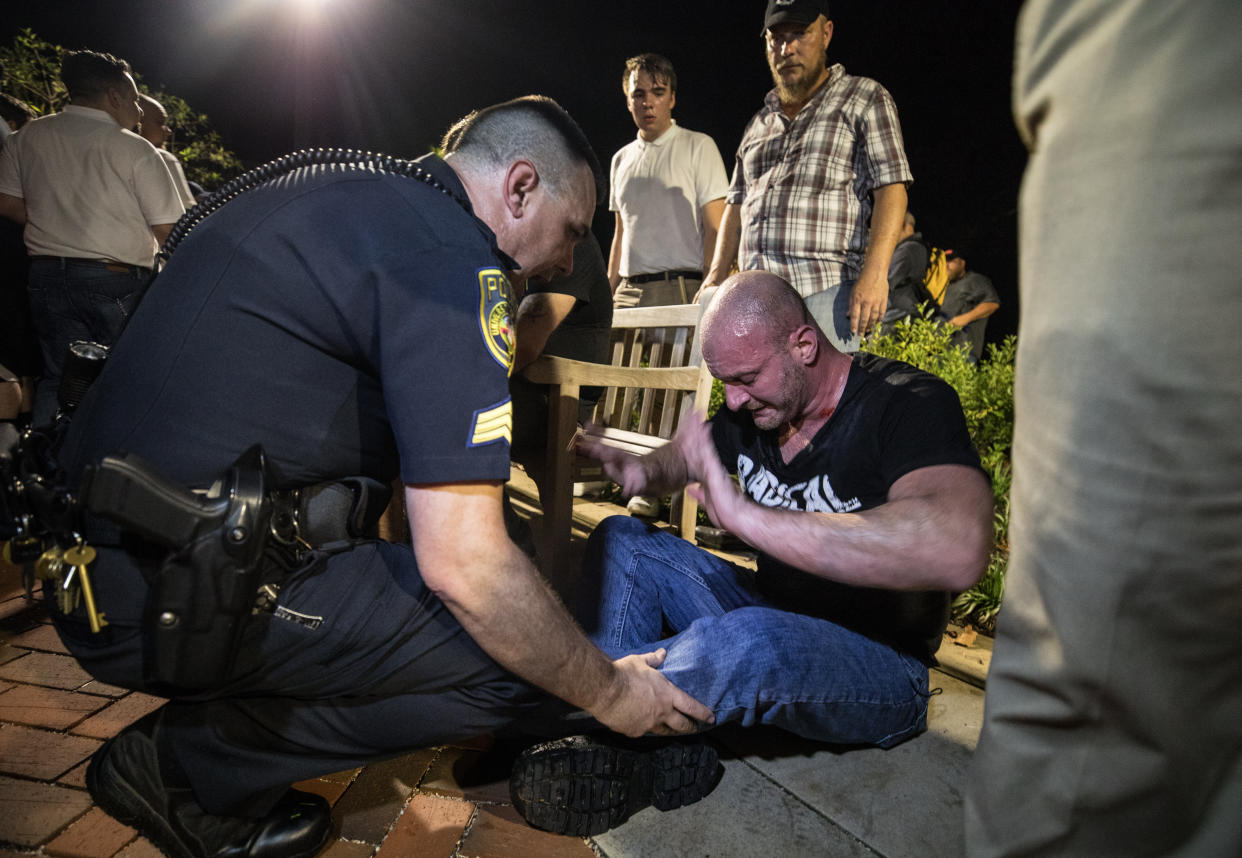'Cryin' Nazi' blames rally organizer for Charlottesville 'catastrophe'

The following is an excerpt from our project Charlottesville: One Year Later. Yahoo News spoke to over a dozen people connected to the deadly August 2017 rally about how things have changed over the past 12 months. To read the rest of their stories, click here.
Last August, Christopher Cantwell traveled from his home in Keene, N.H., to speak at an alt-right rally in Charlottesville. Nearly a year later, he’s finally left Virginia for good — or at least for a court-ordered five years.
The host of a white nationalist internet radio show, Cantwell became more or less the face of the ill-fated Unite the Right rally thanks in large part to a Vice News documentary in which he was featured prominently. His own tearful YouTube video, posted in the aftermath of the violent clashes, earned Cantwell the nickname “Cryin’ Nazi.”
Cantwell later surrendered to police and was charged with felony assault stemming from his use of illegal tear gas during a clash with counterprotesters on the torch-lit march through the University of Virginia the night before the rally. He wound up serving 107 days in a Charlottesville jail and more than seven months under house arrest. Last month, he pleaded guilty to two counts of assault and battery and to violating the terms of his bond by referring to his victims on social media and during his radio show — which he hosted from jail. In exchange for his guilty plea, Cantwell was released from jail — and banned from Virginia for five years.
“It feels good to be home,” says Cantwell, who insists he was framed and coerced into pleading guilty. “It feels good to be done with this whole mess.”
Cantwell’s Charlottesville-related legal woes aren’t exactly behind him; he is the target of an ongoing civil lawsuit by two counterprotesters, including activist Emily Gorcenski, who was pepper-sprayed during the march. (As part of his guilty plea, Cantwell admitted to violating the terms of his bond by talking about Gorcenski and another victim on social media and his radio show. He was fined $250.)
In the closing scene of the now-infamous Vice documentary, Cantwell — sitting in a hotel room amid an arsenal of weapons — reflects on the violent clashes that resulted in one death and several injuries, telling correspondent Elle Reeve that he considers the weekend a victory for his side.
Looking back on it, the 37-year-old former libertarian now says he would have “done a lot of things different.”
“I wouldn’t have gone to that thing if I’d realized what a f***ing catastrophe the people who were putting it together were,” he says, referring to Unite the Right organizer Jason Kessler as “a literal f***ing mental patient.”
To be clear, Cantwell’s regrets about his participation in Unite the Right have little to do with the views espoused by its participants, but rather are based on what he sees as Kessler’s poor planning and his failure to properly prepare for the potential blowback against a gathering of hundreds of white supremacists and neo-Nazis in a city “run by communists.”
“The idea that anybody would follow him into something as dangerous as what we walked into down there is absolutely insane,” Cantwell says.
Despite repeatedly referring to himself as “an entertainer,” Cantwell is unrepentant about his racist and anti-Semitic worldview. In fact, it seems to have only become further solidified in the past year.
“My new favorite catch phrase on the show is, ‘Keep on calling everybody a Nazi, and eventually you’re gonna be right,’ because that’s literally what happened,” Cantwell says. “So I’m in jail, held without bond, without probable cause, facing 60 years in prison because a Jew and a tranny framed me for a crime, and everybody’s calling me a Nazi. Well, you know what? I’m starting to think the Nazis had a f***ing point.” (Cantwell only faced 12 months in prison for his Charlottesville-related charges.)
Though nominally about the preservation of a statue honoring Confederate Gen Robert E. Lee, the underlying objective of the Unite the Right was to bring various factions of the largely internet-based alt-right movement together in real life. For many Americans, the sight of men, most of them young, marching through the University of Virginia campus carrying tiki torches and chanting things like “Jews will not replace us!” served as a shocking realization that such attitudes were still alive in America.
Whatever unity may have existed among the alt-right prior to Charlottesville was largely fractured in its aftermath as efforts to ban some of the movement’s most vitriolic members from social media and crowdfunding platforms drove them further into the darkest corners of the internet. Fears of losing their job and being labeled a Nazi discouraged many from publicly affiliating themselves with the alt-right, while others who sought to channel the momentum of Charlottesville into a real-life political and social movement proved to be full of hot air. Big-name figures in the world of white supremacy, including Cantwell, have discouraged their followers from attending Kessler’s Unite the Right 2, slated to take place in Washington, D.C., this coming weekend.
Likewise, Cantwell disputes the notion that, post-Charlottesville, many people who might have previously held racist views in secret are now more comfortable expressing them.
“I think it had the exact opposite impact of that,” he says. “However, what I will say is that the people who were comfortable voicing them, they’re fanatics now.”
_____
Read more from Yahoo News on Charlottesville, one year later:
New Charlottesville mayor vows to keep pushing ‘until it’s done right’
Vice News journalist on what it’s like to be recognized by Nazis
Charlottesville photographer would return Pulitzer if he could save Heather
Former Virginia governor remembers troopers who died in Charlottesville
Trump’s ‘both sides’ response to Charlottesville still elicits anger



